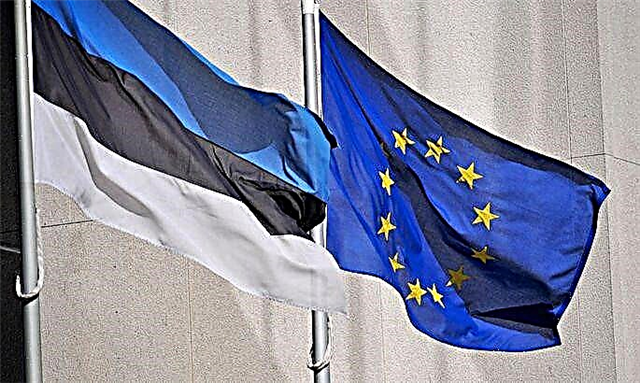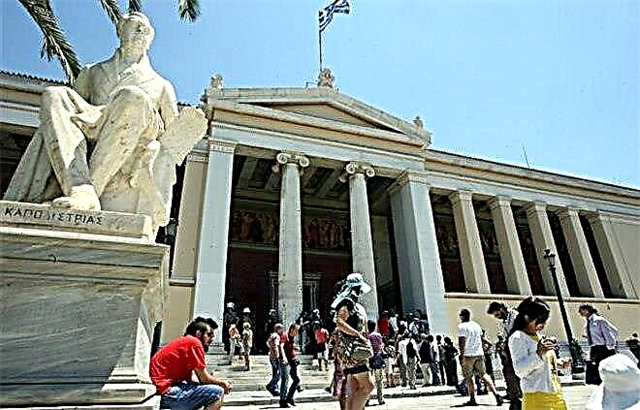Greece is the cradle of scholasticism, the birthplace of prominent philosophers, scientists and poets. Even in ancient times, the issue of education and training of the younger generation was given great importance here. First, the first schools for boys appeared, later Plato founded his Academy. Today, the authorities are doing everything to ensure that education in Greece meets the quality standards adopted in Europe, and every child can get it.

Why choose Greece
The historical past of the Greek state seems to oblige it to cultivate bright minds and educate scientists. A measured way of life, a huge number of architectural monuments reminiscent of the glorious events of past centuries - all this contributes to the development of knowledge and the generation of new ideas in modern science.
Those interested in studying in Greece understand its advantages:
- free training at the highest educational level for residents of the country;
- the opportunity to be enrolled at any stage of the educational process on the basis of attestation points. You do not need to pass additional exams to become a school student or university student;
- living in a country with a large number of resorts, beautiful nature and clean ecology;
- the ability to travel to other countries of the Schengen area without a separate visa;
- diplomas from Greek educational institutions are recognized abroad and highly ranked in the world rankings;
- high chances of finding a job in Europe and in Greece itself after graduation;
- acquaintance with one of the most ancient states of the planet.
How the education system works in the country
The education system in Greece includes several stages that meet international standards. In 2003, all Greek universities joined the Bologna Process, now their diplomas are recognized by all participating countries.
The education of the younger generation takes place in three stages:
- preschool education;
- school secondary education;
- higher.
What is taught in kindergartens
Attending a preschool in the country is optional. Most of the state kindergartens accept kids from 2 years old. Only in large cities (Thessaloniki, Athens) there are still nurseries in which children from 9 months old are enrolled. State-type preschool institutions operate from 9.00 to 14.00.
Preschool education in Greece requires a monthly contribution of about 40 euros. Low-income families are compensated by the state for this payment.
In municipal kindergartens, hot meals are not provided for children: they eat what they take from home. There is no quiet hour as such either. If the child is tired, he can lie down on the couch and rest.
Teachers pay key attention to social adaptation and the development of educational skills. Classes are held in the form of a game.
Private kindergartens are usually full-time and accept pupils from the age of 9 months. Children are provided with meals and can relax in the lounges. But the services of such an institution will cost a family 100-400 euros every month. Sometimes the amount can reach 1000 euros.
In Crete, during the tourist season, children from 6 months old can be taken to a paid day nursery. At any time convenient for the parents, and the children are picked up by special vehicles right from home.
Primary school education
The entire school cycle can be divided into three stages:
- initial - 6-12 years old;
- incomplete secondary education (gymnasium or primary school) - 12-15 years;
- complete secondary (technical schools and lyceums) - 15-17 years.
Attendance at primary school is compulsory and free for all children living in the state, regardless of their civil status and nationality. Students who do not fully speak Greek can attend special language courses free of charge. This makes it much easier for Russians, Ukrainians, Belarusians and migrants from other countries to study in Greece.
In the first two grades, children learn:
- mathematics,
- Greek language,
- Social Studies,
- English,
- music,
- physical education,
- theatrical and visual arts.
In the third grade, religious studies and history become compulsory subjects. In the fifth - sociology, physics, geography, the second foreign language.
Assessment of knowledge is applied only from the third grade and is carried out on a three-point system. In the fifth grade, she becomes ten-point.
At the end of the sixth grade, children are issued a certificate (without exams). On its basis, they are transferred to secondary school.
High school
Every child in the country is also obliged to receive an incomplete secondary education. The academic year begins on September 11-13 and ends in early June. Students do not study on Saturdays and Sundays.

All schools are divided into private and public. In the first, about 6% of children study, but the cost of a visit ranges from 1,500 to 13,000 euros per year.
At this stage, different types of Greek schools (specialized gymnasiums) are available for the child:
- ordinary;
- with a humanitarian bias;
- conservatory;
- for students with mental retardation;
- for children whose opportunities are limited.
Studying at the gymnasium lasts three years. In ordinary school, students study basic subjects in the following branches of knowledge: humanities, natural, economic and foreign languages. Religious studies and the ancient Greek language are required.
Specialized gymnasiums in Greece focus on one group of disciplines.
Each academic year at this stage ends with exams in leading subjects. Those who have not been able to take the test can come for a retake in the fall. If the second attempt is unsuccessful, the student will have to stay for the second year. To avoid this, many sign up for additional courses, the cost of which can reach 100 euros per month for just one subject.
Upon completion of the gymnasium, students are issued a diploma of completion of compulsory incomplete secondary education. Then the child is faced with a choice: to continue learning at the next stage or to start working.
Pupils can complete the secondary level in joint lyceums or in technical schools. The first ones prepare children for entering the university. The study lasts three years. At this stage, there are also specialized educational institutions:
- musical,
- art history,
- mathematical,
- theological,
- experimental.
Upon graduation, students take final exams in leading disciplines. Based on their results, enrollment in universities will be carried out. You must score at least 9.5 out of 20 points.
In a technical school, a general education program is also mastered, and with it the basics of a future profession. From the second year of study, students are expected to practice. At the end of their studies, they take exams, and then receive a diploma and a license to work.
Children of migrants from the Russian Federation and other CIS countries can attend Russian schools in Greece:
- educational institutions of additional education - designed for children studying in public Greek schools and who want to learn more about Russian literature, culture and language. The cost of one lesson in such a school is 5 euros;
- private Russian educational institutions - they can be found in all major cities and where the Russian diaspora lives. These schools often have after-school groups and kindergartens. But the price for education in such a school can be about 6 thousand euros for 1 year;
- a school was founded for the children of Russian diplomatic staff at the Russian Embassy in Greece. It costs 2,000 euros per year to study.
The level of education in public schools is not very high.Failed exams are common. For this reason, many prefer private schools, although education in them costs up to 13 thousand euros for 1 year.
Higher education level
Higher education is possible in two categories of universities:
- universities offering comprehensive academic knowledge;
- technological institutes.
The system of scientific degrees includes three levels:
- bachelor's degree - 4-6 years (duration depends on the chosen specialty);
- Master's degree - 2 years;
- doctoral studies - 2 years.
Each of the stages ends with exams. Future doctors will have to defend a research project.
All universities in the country are state-owned. The creation of private educational institutions of this level is prohibited by law. The academic year lasts from September to the twentieth of June.
At the age of 22, on the basis of a draw, you can become a student at the Greek Open University, which was opened in 1998 in the city of Patra. Training in it is carried out remotely.
Higher education in Greece can be obtained free of charge. But only the most diligent and successful candidates can do this. The school certificate must have the highest score, since there is a large competitive selection to go through.
Those who do not qualify for the competition will have to pay tuition fees. Greek employers always take into account where exactly yesterday's student studied and on what basis. Non-profit education is considered more prestigious here, because it speaks about the level of knowledge of the graduate.
How to choose a university
Greek universities offer a wide range of professions and fields. But before starting to study, a foreign applicant will have to complete language courses and take a test. If you believe the reviews, he learns Greek quickly, and the exam does not cause any particular difficulties; but don't take it lightly.

The cost of training for the courses is about 600 euros. If the test is successful, the candidate is issued a certificate, on the basis of which the enrollment will be carried out.
If we consider educational institutions in Athens, you should pay attention to the following universities:
- National University named after Kapodistrias - is considered the oldest university in the country (founded in 1837). 5 institutes and 5 independent faculties operate on its basis:
- philosophical,
- theological,
- medical,
- legal,
- economics and political sciences,
- natural sciences.
- National Technical University - here you can get an engineering degree in almost any field. Among the graduates of the university is the current Prime Minister of the country, Alexis Tsipras.
- School of Fine Arts - has the status of a university, is a leading educational institution in this area.
Other popular universities in the country include:
- Aristotle University (Thessaloniki) - one of the largest universities in the Balkans, ranks first in Greece. Almost 100 thousand students study here in 12 faculties. For foreign citizens, it is possible to study in English, French and German.
- University of Piraeus (Piraeus) - prepares specialists in the field of IT-technologies, management and economics. It is famous for a large number of conducted research and conferences.
- University named after Democrita - founded in 1973, located in the city of Komotini. Education is conducted in the following specialties: history, physical education, law, business administration, Greek literature.
Economics education is best obtained at the University of Economics of Athens. The university has been operating since 1920 and is considered one of the best in the country in this direction. It has nine faculties.
No less prestigious will be a diploma obtained at the University of Thessaly (Volos), the University of Crete (one of the most famous universities in the Greek islands), the University of Macedonia (Thessaloniki).
Admission to a Greek university
The procedure of how to enter a Greek university deserves special attention. Applicants who come from countries that are not part of the European Union must apply to the Unified Admissions Committee, which operates under the Ministry of Education, Culture and Sports. Applications are accepted for ten days, from 20 to 30 July.
Package of documents
In order for the application to be considered, the following package of documents must be prepared:
- Questionnaire indicating the selected faculties (no more than 20).
- Copy of your passport.
- Secondary education certificate.
- A certificate containing an indication of the average grade of the certificate, translated into a twenty-point scale. You can get it from the Ministry of Education in your home country or from its diplomatic mission in Greece.
- Confirmation that the candidate and his relatives do not have Greek citizenship.
- A certificate confirming that the applicant's grades allow him to enter a university in his homeland.
- Written confirmation that the applicant has not previously studied at universities in Greece.
All documents must be translated into Greek and apostilled. The decision on enrollment will be made within three months.
If the applicant is interested in master's degree in Greece, he will have to confirm the diploma. To do this, you need to contact the General Center for the Recognition of Diplomas of Foreign Universities - DIKATSA. To confirm the document on education, you will have to pass exams and pay a fee of 120 euros.
Obtaining a visa
To be able to study in the territory of the Greek state, you must obtain a student visa. To do this, you need to submit a petition to the Greek Consulate in your homeland and attach the following package of documents to it:
- International passport.
- Visa application.
- Two photos 35x45 mm in size.
- A copy of the national passport.
- An invitation from the university.
- Medical certificate confirming the absence of dangerous diseases.
- Confirmation of the availability of funds in the bank account (from 6,000 euros).
- A certificate stating that the applicant has no criminal record.
- Insurance for the entire period of stay in the country.
- Confirmation of the availability of a place of residence (hotel reservation, apartment rent, dorm room).
- Receipt for payment of the fee - 120 euros.
The documents must be translated into Greek and notarized.
The visa is valid for 1 year. After which it will have to be extended without leaving Greece.
Duration and cost of training
The length of stay in training will depend on the grade level. The main data are shown in the table:
| Type of training | Student age | Duration of the course | Average cost in euros |
|---|---|---|---|
| Summer camps | 5+ | 1-4 weeks | 350 |
| Language learning schools | 6+ | 1-12 weeks | 600 |
| Secondary school level | 6+ | 1-12 years old | free at a public school; from 2,000 per year - in private. |
| Preparing for the university | 16+ | 1-3 years | 5,000 per year |
| Bachelors degree | 17+ | 4-6 years old | 4,000 in 1 year |
| Master's degree | 20+ | 1-3 years | 4,500 in 1 year |
| Doctorate | 20+ | 3 years | 3,000 for 1 academic year |
The possibility of obtaining scholarships and grants
The distribution of grants, which are issued for training and research work, is the responsibility of the Greece Scholarship Fund. But only those who study in master's and doctoral programs can apply for them.
Graduate students can apply for compensation for the costs of writing a dissertation. The amount of compensation is about 600 euros.

It is possible to apply for a scholarship that will cover the costs of studying the Greek language. It is issued for 1 year and amounts to 500-600 euros per month. If the exam is passed successfully, one can expect to be paid by the state for the entire course of study at the university.
But it should be remembered that there are much more people who want to receive assistance than the Fund can cover, and therefore selection is carried out on a competitive basis.
How students live
When admission to a Greek university is over, students have new questions. One of them is what is student life in Greece.
Most universities provide youth hostels. Most often they are located in the immediate vicinity of the university.Rooms are designed for 1-2 people. Payment - about 100 euros for 1 month.
Those who do not get a room have to rent apartments. Their cost is 150-250 euros per month (excluding utilities - another 120-130 euros per month).
If you learn to save money, food costs can be reduced to 100 euros per month. Universities provide free meals to their students. But it cannot be called varied, and therefore you will have to think about additional breakfasts and dinners.
Mandatory expenses include:
- visa extension every year - 150 euros;
- travel, communication fees - 30 euros with a student discount;
- stationery - up to 10 euros;
- leisure - from 20 euros (4 cups of coffee and 2 alcoholic drinks).
Non-EU students can study and work in parallel, but not more than 20 hours each week. Vacancies in restaurants and hotels are in demand.
Some universities have internship programs in which a student can earn about 500 euros per month of practice.
Job prospects
Working in Greece, even for those with a master's degree, is not the fastest-growing dream. IT professionals and those who intend to work in the tourism sector have the most chances. But for the humanities it will be difficult. The right decision would be to go with a Greek diploma to Europe.
Graduates from Greek universities are valued in the European labor market. But you need to think about finding a prestigious place while studying.
For example, try yourself in student exchange programs, publish in magazines, learn several foreign languages at once, try to leave for an internship in Europe. Such candidates are considered by European employers in the first place.
Outcomes
The educational system in Greece is structured in the same way as in most other European countries. Only elementary and junior high school is compulsory.
To study at a university, you need to graduate from a lyceum or technical school. Excellence students can enroll in free tuition, but there are additional costs.











